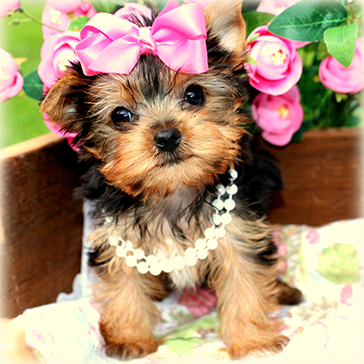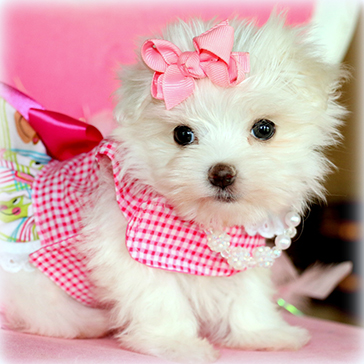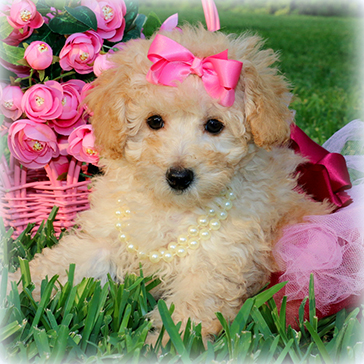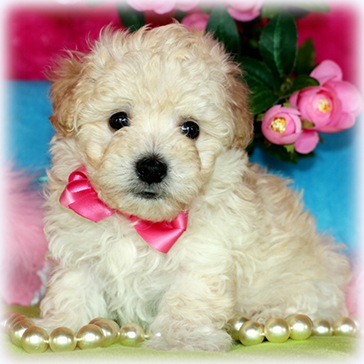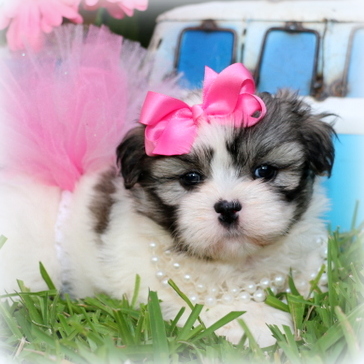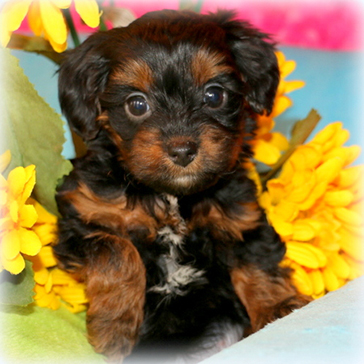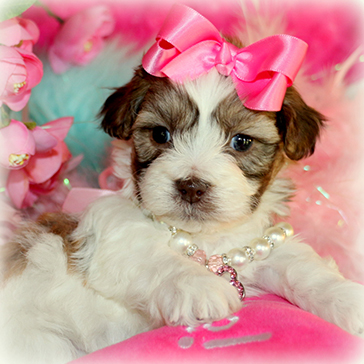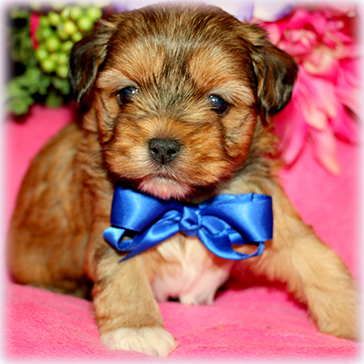Your Title Goes Here
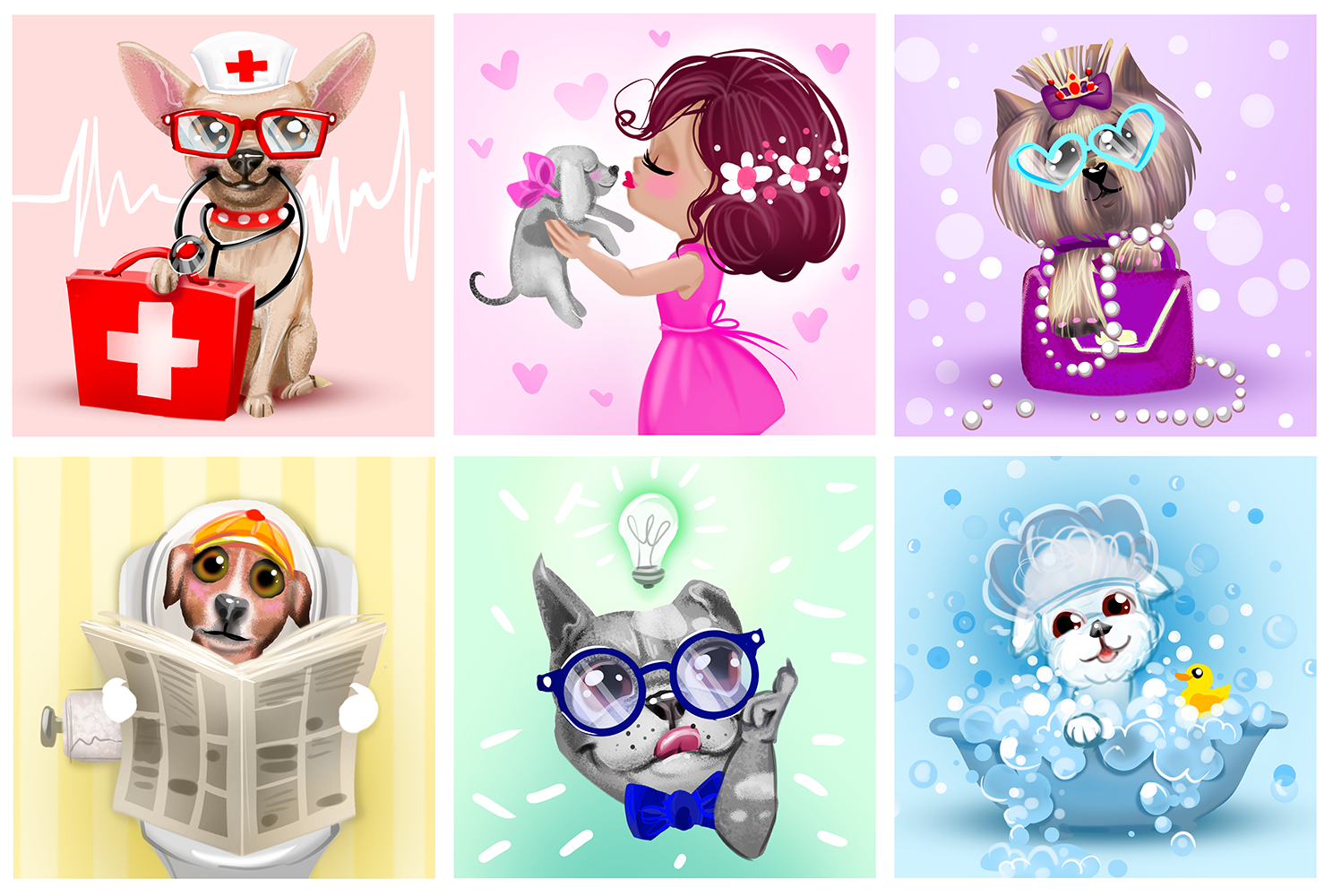
Frequently Asked Questions
FAQ Topics
General
1. Should I adopt a male or female puppy?
2. What are the benefits of spaying and neutering our dog?
Females:
- Lives a longer and healthier life
- Helps reduce uterine infections and breast cancer. Spaying your dog before her first heat offers the best protection.
- No heat cycles, therefore eliminating bleeding.
- Helps fight pet overpopulation
- Eliminates unwanted pregnancies
Males:
- Prevents testicular cancer if neutered before 6 months of age.
- Reduces or eliminates the marking of territory and spraying
- Better behaved
- Prevents unwanted pregnancies
- Helps reduce the roaming attributed to finding a mate. Therefore, reducing the risk of fighting with other males and injury in traffic.
- Helps fight the pet overpopulation
Spaying or neutering does not make your pet over weight.
3. What age do you let your puppies go home?
They have to be at least 8 weeks old to go to their new home. The time may be different for each puppy, they will stay here until they are completely ready to go to their new home. My first concern is the welfare of the puppy. I do not want any problems for either you are the puppy when you get home.
4. Can I come see my puppy before I pay for it?
Of course, you are welcome to see your puppy before you buy it 😉
5. Why is dog breeding important?
6. How can I get my puppy to stop chewing on everything?
7. Why doesn’t my puppy like being picked up by my kids?
8. Can I have a video clip of a specific puppy?
We do not have video clips on all of our puppies due to the large amount of time that it takes. Digital pictures are updated frequently.
9. How do I know what breed is best for me?
10. What Is Puppy Socialization?
11. How Can I Socialize My Puppy?
How can I ensure that the standard poodle puppies for sale in Louisiana are from a responsible and ethical breeder?
To ensure the standard poodle puppies for sale in Louisiana come from ethical breeders, prioritize research. Look for breeders who strictly adhere to the highest standards of cleanliness and care. Ensure they conduct health testing and provide health guarantees. At Princess Puppies, ethical breeding is our cornerstone. We prioritize the well-being of our puppies and breeding dogs, offering a safe, loving environment. Contact Princess Puppies today for ethically bred standard poodle puppies in Louisiana, where we uphold the utmost commitment to responsible breeding practices.
Can I find both male and female poodle mix puppies for sale in Louisiana?
Yes, you can find both male and female poodle mix puppies for sale in Louisiana. Princess Puppies often has a variety of poodle mix puppies available, including males and females. Whether you’re looking for a male or female poodle mix puppy, we can help you find the perfect companion to fit your lifestyle and preferences. Contact Princess Puppies today to inquire about our current availability of male and female poodle mix puppies for sale in Louisiana.
What are the characteristics of toy poodle puppies for sale in Louisiana?
Toy poodle puppies for sale in Louisiana typically exhibit charming characteristics that make them beloved companions. These puppies are known for their small size, intelligent demeanor, and playful personalities. Toy poodles are often described as affectionate, loyal, and highly trainable, making them excellent family pets. They have hypoallergenic coats that require regular grooming to maintain their fluffy appearance. Additionally, toy poodle puppies are known for their agility and ability to excel in various dog sports and activities. If you’re interested in welcoming a toy poodle puppy into your home in Louisiana, contact Princess Puppies to learn more about our available puppies and their endearing traits.
What is the typical size and weight range of small Morkie puppies for sale?
Small Morkie puppies for sale typically have a size and weight range that can vary. On average, Morkie puppies weigh between 4 to 7 pounds and stand around 6 to 9 inches tall at the shoulder when fully grown. However, individual puppies may fall slightly outside of this range depending on factors such as genetics and diet. Morkies, a mix of Maltese and Yorkshire Terrier breeds, are considered small dogs. This makes them suitable for apartment living and households with limited space. If you’re interested in small Morkie puppies for sale, reach out to Princess Puppies to inquire about our available morkie puppies.
Are miniature Morkie puppies for sale suitable for apartment living?
Yes, miniature Morkie puppies for sale are generally well-suited for apartment living. Morkies are small in size and typically weigh between 4 to 7 pounds when fully grown. Their compact size makes them ideal for apartment living, as they don’t require a large amount of space to thrive. Additionally, Morkies are known for their adaptability and ability to adjust to different living environments. They are generally low-energy dogs that enjoy indoor playtime and short walks. Contact Princess Puppies to learn more about our available miniature Morkie puppies for sale and find the perfect companion for apartment living.
Purchasing A Puppy
1. What size will my puppy be as an adult?
2. How Does Securing a Deposit Work?
3. Do you ship your puppies?
4. Do I have to have a Pay Pal account to buy a puppy?
5. How do I know this is not a scam?
*Check out our facebook page, where many of our past families have posted comments and pics of their puppies that they have adopted from Princess Puppies.
*We have a verified Pay Pal account in good standing for the last 15 years.
*We will never ask you to wire money.
*We have reference upon request.
*Check out our testimonial page
*Please read our blog post Beware of Puppy Scams
6. Why should I buy my puppy from Princess Puppies?
*We offer a Health Guarantee above and beyond almost anyone. This is our way of letting you know that we stand behind our puppies.
*We have been raising puppies for 15 years and have the knowledge base that goes along with that.
*We always vaccinate and deworm our puppies.
*We provide as much education as possible to ensure that your puppy has a smooth transition from our home to yours.
*We care about the emotional & physical health of our animals. We strive to produce healthy, happy and well socialized puppies.
*Most of our customers are sent to us by word of mouth from past families that have adopted from Princess Puppies.
*Please read our Code of Ethics
7. Is this a puppy mill?
This is absolutely NOT a puppy mill. Our dogs are very well cared for, loved and each one is special in their own way to our family. No amount of money is more important than the emotional and physical health of my animals. I have heard people say, “watch our for people with more than one breed.” That offends me!! I love all my breeds and don’t want to pick only one specific breed to raise and enjoy. This is the hobby I have dreamed of since I was a little girl and I take pride in knowing that my four-legged babies are so loved and well taken care of.
Care And Feeding
1. What is my puppy's feeding schedule?
Your little puppy should be eating every 3-4 hours for the first couple weeks after going to their new home. Eating frequently will help reduce to chance of your puppy experiencing Hypoglycemia (low blood sugar). I suggest leaving the dry puppy food and water out at all times so they can eat when needed. You can get your new baby on a feeding schedule after they get a little older.
2. What is my puppy eating?
3. What if my puppy will not eat?
4. What should I bathe my new puppy with?
5. What should I bathe my new puppy with?
6. What treats do you recommend for my new puppy?
Your new puppy is used to getting Nu Vet Plus, this is all natural and a full spectrum immune system booster to keep you puppy healthy. Ingredients are human grade also, YIPPEE!!! Not only is Nu Vet Labs great for their health, here at Princess Puppies we use it as a treat and they LOVE it! It is liver based and tastes so good to them! Yummmmyyy! It is NOT sold in stores, so you will need to order it. Order it now, so you will have it when your new puppy comes home.
TO ORDER CALL: 800-474-7044
YOU WILL NEED ORDER CODE #: 65760
7. When can I take my puppy to the dog park?
8. When is the right time to show your dog affection?
9. How much does my puppy need to eat?
10. Are there human foods that are safe for dogs?
11. Should I brush my pet’s teeth?
- Signs of teeth and gum diseases begin occurring in 80% of dogs after reaching the age of 3.
- Because of the fact above, veterinarians recommend yearly professional cleanings, especially as your pet gets older, along with daily brushing by pet owners to combat this.
- The serious effects of dental problems can be prevented by proactive, preventative care. Help your pet with his beautiful smile; in doing so you will be promoting overall good health!
Potty Training
1. How do I potty train my new puppy?
Puppy Pad Training is recommended until fully vaccinated!! There are many different ways to house train puppies. One option for house training your puppy is to teach him to pee on a house training pad. Teaching your puppy to pee on a pad is very similar to teaching him to relieve himself on newspapers. Instead of newspapers you’ll be using house training pads designed for the purpose.
Choosing Where To Put The Pads
In order to train your puppy to use house training pads you should place the pads in the area you have chosen for your puppy to use. Ideally, this will be a somewhat confined area so your puppy will have a smaller choice about places to go. A kitchen, den or laundry room often makes a good choice. Any room with a tile or linoleum floor is a good choice since floors of this type are easy to clean if your puppy has an accident.
Watch For Signs
Once you have everything set up you should help your dog get started using the house training pad. You can do this by spending time with him and watching for signs that he needs to relieve himself. As soon as you see the signs, take your puppy to the house training pad and give him a word so he can associate it with the pad such as “potty” or “papers.” Your puppy should use the house training pad as designed. Make sure you praise your puppy to let him know that he’s done a good thing.
Put Your Puppy On A Schedule
Although your puppy may catch on that he’s supposed to use the house training pad, he may still need frequent encouragement at first. You can help your puppy if you will put him on a definite schedule. Take your puppy to the pad as soon as he wakes up in the morning, right after he eats, when he wakes up from naps, and right after he has a big play session. These are all times when puppies usually need to potty. You should also make sure your puppy uses the pad before he goes to sleep at night.
Watch for accidents
Your puppy will almost certainly have a few accidents so don’t be surprised by them. He’s only a puppy and he will make mistakes. If you catch your puppy in the act of having an accident then you should clap your hands or make some other loud noise to startle him and let him know that this is inappropriate behavior. Carry him to the house training pad and encourage him to finish there. Then praise him. If you find an accident after it’s already happened, let it go. Puppies have a short attention span and if you punish your puppy for something that’s already happened he won’t have any idea why he’s being punished. Instead, take the blame yourself and make a mental note to watch for the signs more closely the next time.
2. When should I start training my puppy?
Puppy Health
1. Has my puppy been de-wormed and are they up to date on vaccinations?
2. When should I take my puppy to the vet?
3. What if my puppy gets nauseated on the way home?
4. Why does my dog eat grass?
5. My Older dog seems to have dementia...Is it possible?
- Seems lethargic
- Not interested in usual activities
- Change in sleeping patterns
- Seems confused
6. What can I expect at my puppy’s first veterinary exam??
7. When should I give my pet medication for heartworm, fleas, or ticks?
- Heartworm medication should be provided for pets on a consistent basis by the time they reach the age of six months. This is especially relevant for areas of the globe, like North America, where mosquitoes, the carriers of heartworm, are relatively prevalent.
- Flea medication can be applied as a preventative or on an as-needed basis, i.e., when infestation occurs! There are various types of flea medication including pills and ointment. Some work better than others, so talk to your vet!
- Much of the time, medications on the market combat both ticks and fleas at the same time. So when should you invest in these types of pills? Some people try to be proactive in fighting off these pests since ticks especially can be very harmful for our pets if they pounce. During the months of summer and spring, the likelihood of infestation is at it’s highest, but that doesn’t mean the bugs won’t show up when the weather gets cold! A breakdown of this winter tick and flea reality can be found here in an article by PetMD. Though fleas and ticks are less prevalent at certain times to be sure; during winter, medication is still a good idea
What role does age play in choosing the best food for my small breed puppy?
Age is crucial in selecting the best food for small breed puppies as their nutritional needs change with growth. Puppies require food rich in proteins and fats for development, with specific formulations for different stages of their early life. Consulting a veterinarian can help you choose the best food based on your small breed puppy’s age.
How do I choose the best toys for small breed puppies?
When choosing the best toys for small breed puppies, consider their size, chewing habits, and level of activity. Toys should be appropriately sized to prevent choking hazards and durable enough to withstand teething. Interactive toys are also beneficial for mental and physical stimulation.
What are the key attributes of the best small breed puppy training treats?
The best small breed puppy training treats should be small in size, highly palatable, and nutritious. Look for treats with quality ingredients, low in calories, and easy to digest. The right treats can significantly aid in positive reinforcement training techniques.
What is the best dry food for small breed puppies?
The best dry food for small breed puppies should contain high-quality proteins, essential fats, and balanced nutrients suitable for their rapid growth phase. Look for products specifically formulated for small breeds, as they have different nutritional needs compared to larger breeds. It’s advisable to consult a veterinarian for personalized recommendations.
Contact us
If you would like to request additional information about available puppies, please enter your contact information and we will get back to you as soon as possible. We would love to hear from you! Please read the FAQ PAGE before calling.
Available Puppies
-

Sebastian
$2,200.00Hi, I’m Sebastian 🐾 I’m a little poodle guy with soft red curls, a teddy bear face, and a personality that’s equal parts charming and silly. I’m smart, affectionate, and always ready to make you laugh—poodles are wonderful companions because we’re intelligent, loyal, and love being right in the middle of family life. If you’re looking for a puppy who’s cute, clever, and guaranteed to keep you smiling, I might just be your guy. ❤️Click Here: More About Sebastian -

Theodore
$2,200.00Click Here: More About TheodoreHi, I’m Winston 🐾 I’m a Maltipoo boy with soft, fluffy curls and a teddy bear face that people say is impossible to resist. I have a happy, loving personality and enjoy cuddles just as much as playtime. I can’t wait to be your little shadow, bring smiles into your home, and remind you every day how special puppy love can be. 💙
-

Poppy
$2,500.00Click Here: More About PoppyHello, I’m Poppy. I’m a very small Malti-Poo with a delicate little body, short legs, a tiny teddy bear face, and soft creamy-apricot curls. I have a gentle, affectionate nature and feel happiest in calm moments spent close to my people. Because of my petite size, I’m best suited for a family experienced with caring for tiny puppies and able to provide the extra attention and thoughtful care I need. In the right home, I promise to be a loving and loyal little companion.
-

Petite Pixie
$2,300.00Click Here: More About Petite PixieMeet Petite Pixie, a truly tiny black Maltipoo whose name perfectly matches her delicate size and fairy-like charm. She has a very small body, petite facial features, and soft black curls that give her an irresistibly gentle look. Pixie would thrive best in a calm, low-stress home with a family experienced in caring for very small puppies and able to provide the extra attention and nurturing she requires. In the right environment, she will be a sweet, loving companion who brings quiet joy to her family. 🖤🐾
-

Annabelle
$2,300.00Click Here: More About AnnabelleMeet Annabelle, a sweet little Morkie girl with cute short legs, a compact body, and beautiful soft hair you’ll find yourself petting nonstop. She has a laid-back, loving personality and prefers cuddles over chaos, making her the perfect tiny sidekick. Bringing a puppy like Annabelle into your home means more smiles, less stress, and a daily dose of unconditional love—because it’s hard to have a bad day when someone this cute is waiting for you. 🐾💗
-

Curly
$2,200.00Click Here: More About CurlyMeet Curly, an absolutely adorable black-and-white Shih-Poo boy with the softest, relaxed curls and a habit of sticking his little tongue out when he’s feeling happy. He’s sweet, gentle, and full of charm, with a personality that melts hearts the moment you meet him. Curly isn’t just cute—he’s the kind of puppy who makes your house feel warmer, your days happier, and your arms permanently occupied with cuddles. If you’re looking for a lovable little companion with looks and heart, Curly is ready to steal yours. 🐾💙
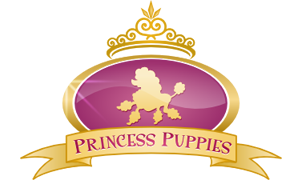

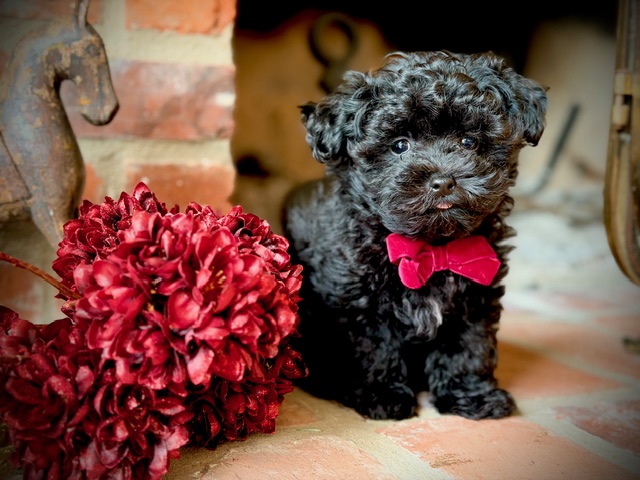
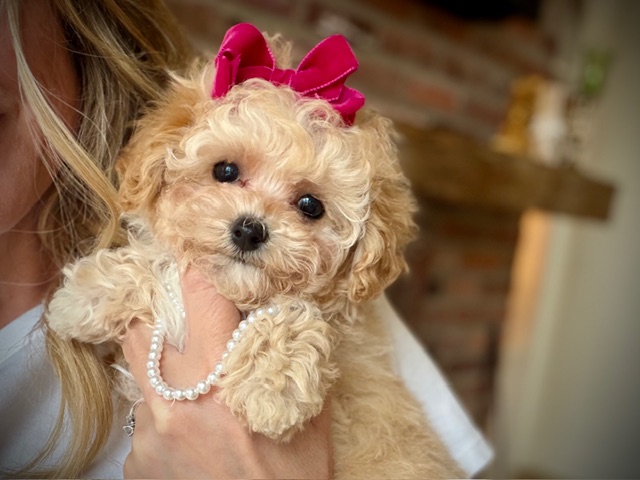
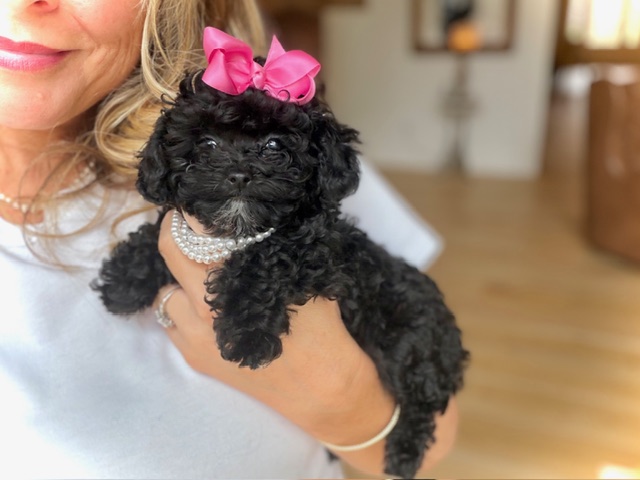
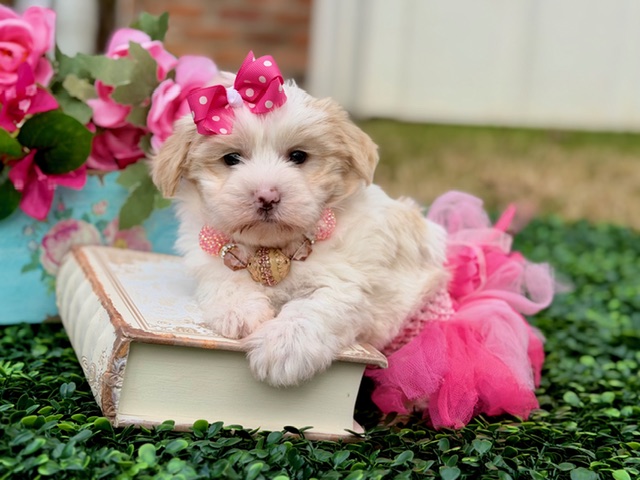
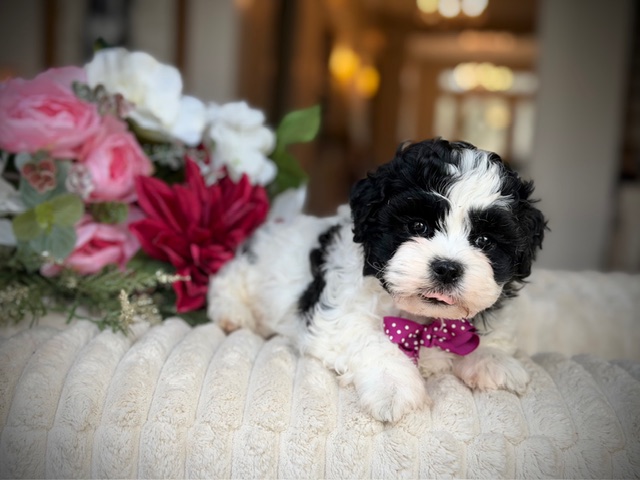
 318-613-2898
318-613-2898
